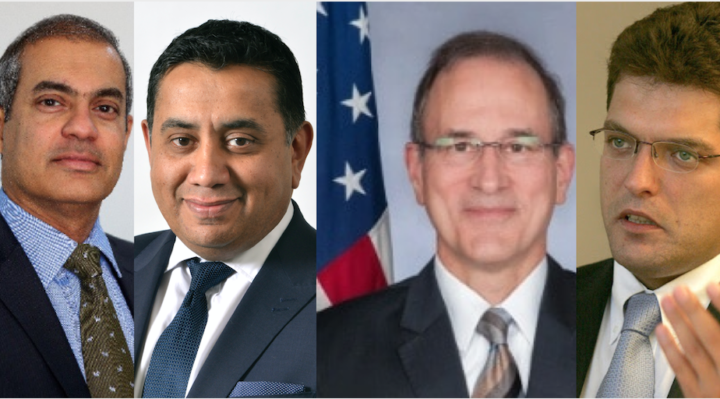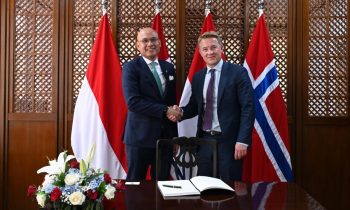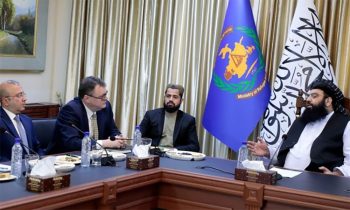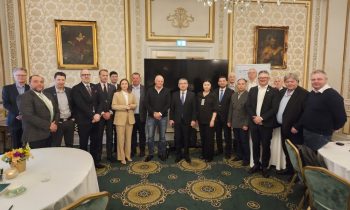The United States is “actively working” on sanctioning Myanmar military officials responsible for the oppression of the Rohingya minority, Deputy Assistant Secretary of State Richard Albright told reporters on Thursday.
“We are taking actions, including the imposition of visa sanctions and financial sanctions, on Myanmar military officials,” Albright said at the telephonic press briefing after the virtual conference on the support of Rohingya refugees.
The United States’ approach of supporting affected people is based on providing humanitarian assistance to refugees and internally displaced persons and holding accountable those who are responsible for atrocities, Albright added.
Earlier on Thursday, the United States announced a new aid package worth USD 200 million to support Rohingya refugees who fled Myanmar.
According to data provided by the UN Refugee Agency (UNHCR), more than 800,000 Rohingya have fled from Myanmar’s Rakhine State to Bangladesh between 2017 and 2019 amid clashes there.

Below is a full rush transcript of the press conference with Richard Albright Deputy Assistant Secretary for the Bureau of Population, Refugees, and Migration at U.S. Department of State And Lord Ahmad of Wimbledon Minister for South Asia and the Commonwealth UK Foreign, Commonwealth & Development Office And Janez Lenarčič Commissioner for Crisis Management European Commission And Indrika Ratwatte Director of UNHCR’s Regional Bureau for Asia and the Pacific.
DAS Albright: I would like to start really by just stating how pleased we, the United States, has been to partner with the United Kingdom, the European Union, and the UN High Commissioner for Refugees to co-host today’s conference. I want to recognize the governments and people of Bangladesh, Vietnam, Thailand, Indonesia, Malaysia, and others for their responsiveness to the needs of Rohingya refugees.
This conference sought to sustain the international response to the Rohingya crisis and the international community has come together once again to help alleviate the suffering of those in need and to invest in the generous host communities that help them as well. We’re very pleased with the turnout and to know that nearly 200 million in additional – $200 million in additional humanitarian assistance the United States announced today is part of nearly $600 million in total assistance announced by the international community today.
Looking forward, the most immediate step is for the Government of Myanmar to permit humanitarian aid to flow to those in need and to create the conditions for sustainable returns of displaced persons in line with the recommendations of the Advisory Commission on Rakhine State. And we support the work of the UN Special Envoy Christine Schraner Burgener to press for solutions to the crisis.
In the coming weeks and months, we look forward to following up on efforts to provide Rohingya refugees and other displaced Rohingya with expanded opportunities to live lives with dignity and to resolve the root causes of the crisis. The international community could play an important supporting role, but it is essential to understand that the Government of Myanmar is at the heart of a permanent solution, and we stand ready to support concrete improvements in Rakhine State in parallel with continuing to respond to the needs of Rohingya refugees in the region.
Mr. Ahmad: Today’s conference, as we’ve just heard, has brought together the international community in solidarity to show that the world has not forgotten the plight of the Rohingya people. It’s hard to grasp the size of the humanitarian crisis faced by the Rohingya community. But more than 740,000 were forced to flee their homes in the face of horrific brutality over three years ago. Three years later, they are no closer to going home, despair is setting in, and they’re also dealing, of course, with the realities of the coronavirus.
Today at the conference, the United Kingdom on our part announced a further £37.5 million to stop the suffering for hundreds of thousands of Rohingya refugees in Cox’s Bazar. That brings our total UK commitment to the Rohingya response since August 2017 to close to 300 million pounds sterling. This UK aid will – new UK aid will provide vulnerable people with food, healthcare, water, and sanitation. And it also importantly improves access to education for 50,000 young people, as well as isolation and treatment centers for people suffering severely from coronavirus.
Also recognizing the important role of the Government of Bangladesh and the Bangladeshi people, the UK has also announced £10 million of support to Bangladesh to help their country respond to the coronavirus and natural disasters, such as flooding, bringing our total new announcements today to 47.5 million.
The UK stands at the forefront with international partners of providing life-saving aid, food and water and shelter, as well as education and counseling. In addition to that, the UK has also sanctioned two generals in the Myanmar military as recommended by the UN independent investigation, which found them responsible for atrocities against the Rohingya community which is tantamount to ethnic cleansing.
We have also made it clear along with the entire UN Security Council that Myanmar must take solid and constructive steps to create the conditions that will allow for the Rohingya to voluntarily return to Myanmar, of course, keeping in mind their safety and dignity. And as well as being the second-largest donor to the Rohingya crisis, the UK continues to provide aid in Myanmar itself, including health, clean water, sanitation within the Rakhine State as well. That amounts to about £44 million to all communities since 2017.
And finally, we stand with other international partners in the need to support this event as a co-host with the United States, the European Commission, and UNHCR, to working together and committing ourselves once again to decisive action that will allow the Rohingya community to return safely back home. Thank you.
Mr. Lenarčič: Ladies and gentlemen, today we have come together to demonstrate again our solidarity and support of the Rohingya people. We are very much grateful to the government and the people of Bangladesh, as well as other host countries, for their continued support of Rohingya refugees.
After this conference, many countries and institutions have reiterated their commitment towards the Rohingya community. And for its part, the European Union has agreed to step up its efforts, pledging 96 million in support of the Rohingya crisis in the year 2020. But of course, as we all know, humanitarian aid is not enough. First, we must pursue a sustainable, durable solution to this crisis. And this means we have to continue to seek and facilitate the safe and voluntary return of the refugees to their places of origin or choice. And in this context, I would say that the recommendations of the Rakhine Advisory Commission are a good basis for this.
Second, we must continue to support the Rohingya people’s aspirations for a better future, including, in particular, providing access to education to all Rohingya children.
And finally, we must ensure that this crisis does not become a forgotten tragedy. The European Union continues to stand ready to assist with its efforts. The Rohingya people and their host communities can count on our support also in the future. Thank you.
Mr. Ratwatte: I’d like to start by thanking our co-hosts, the governments of the United States, the UK, and the EU for the collaboration in pulling together this very important meeting. And as the High Commissioner expressed in his closing remarks, we are grateful for all of those who have participated today and the strong financial support for the Rohingya refugee situation and the displaced Rohingya within Myanmar.
Most of all, we’re grateful for the contributions of the refugees themselves, who are at the heart of the humanitarian response and show us all daily how capable they are as individuals and as a community, as we heard from the refugee voices and the powerful film clip in Omar’s Film School.
We must also particularly express the thanks to Bangladesh, who continues to host 860,000 Rohingya, as well as Malaysia, India, Indonesia, and Thailand, as generous hosts despite the challenges imposed with COVID, as we see today.
Ultimately, we must live up to the hope that the Rohingya refugees themselves still maintain, even after more than three years of exile. We are concerned by the risks that many are taking on perilous journeys, as we have witnessed this year with the tragic loss of life. And we are grateful to those countries who have allowed them to disembark safely, and urge all that the strategy must remain on the safe, predictable disembarkation to save lives and to prevent the tragic loss of life we have witnessed in the recent months.
As you have heard, the Rohingya wish to go back to Myanmar when it is safe and sustainable to do so. As such, we must renew our efforts together with the Government of Myanmar to realize the recommendations of the Rakhine Advisory Commission, which is the roadmap that we have collectively agreed to pursue, and to make the aspirations and the hopes expressed by the refugees themselves into reality. To this end, UNHCR stands committed in solidarity and in partnership to work with the international community, Bangladesh, Myanmar, and the host countries in the region and beyond to make this a reality. Thank you very much.
Question: Did I understand correctly that the total raised today was $600 million? Is that what you expected? Is it less or more?
Mr. Ahmad: It’s Lord Ahmad here, minister of state from the UK, and perhaps others could follow. I think if you look at the backdrop of today’s donor conference and the fact that the world itself is going through the incredible challenge of the COVID-19 pandemic, and of course the increased challenges posed on economies around the world and of course domestic challenges, I think the fact that over $600 million, over half a billion dollars, has been raised at today’s event I think is a testament to both the solidarity and the common humanity we share in standing up for the Rohingya community.
So I’m very much not just encouraged but delighted and also quite humbled by the generosity of countries from across the globe who have once again come forward and made generous contributions.
DAS Albright: I would add to – I would concur with that. Coming into the conference today, the humanitarian response plans were nearly 50 percent funded for the year. So this is added, additional, new funding to a much more sustainable level, which is where we were hoping to achieve. Thank you.
Mr. Lenarčič: If I may add from Brussels, Janez Lenarčič from the Commission, this amount almost doubles what was available or pledged so far toward the Rohingya crisis. That’s one point. Second point, you cannot compare different situations because there are different numbers of people who are in need of humanitarian aid. So there is no reason for a comparison in absolute figures of pledged sums with some other situation.
We are happy with the result of today’s pledging event, with today’s conference. It demonstrated the solidarity of the international community, the continued solidarity of the international community with the plight of the Rohingya refugees and the needs of the host communities.
Question: Do you have any comment on the reaction of China and Russia? Do they still support the Burmese Government ?
DAS Albright: Well, what I can say is that these other countries were invited to the conference. They chose not to participate. We are working very hard with our partners, UN agencies, NGOs, and other governments, to stop the cycle of violence in Rakhine, including by cooperating to end trafficking of weapons and narcotics that have contributed to instability so far in Rakhine and other parts of Myanmar. And we believe that the permanent five members of the UN Security Council have a special obligation to contribute to ending conflict and aiding the victims of violence.
We certainly recognize the contributions of other regional partners, and encourage responsiveness to the needs of the Rohingya refugees and the displaced Rohingya inside of Myanmar. And we are trying to develop a multifaceted approach to resolve this crisis in adherence with international humanitarian principles, and avoid any kinds of unilateral measures, so that I would just stress that returns to Myanmar should be safe, should be voluntary, dignified, and well-informed. Those are the principles that we adhere to in this response.
Question: First of all, the 597 million that were announced as the amount being raised today, are you satisfied that that is all new funding? That wasn’t announced by donors before today? Second of all, there’s been quite a bit of talk about the security situation in the camps in Cox’s Bazar. Recently, I’ve spoken recently with Rohingya refugees who are very scared of violence occurring within the camps by criminal groups, and more recently by Bangladeshi security forces. What that something that’s factoring into thinking of the humanitarian response? And what’s being done to alleviate that?
Mr. Ahmad: I mean, every country, obviously, would need to speak for itself. This is part of an additional monies to what we had announced previously for support for the Rohingya, and as I said in our contribution from the UK, we’ve sought to also recognize the challenge on Bangladesh in providing support to the Rohingya community both within Cox’s Bazar but also outside Cox’s Bazar as well.
On your specific issue of the escalation of violence, I’m sure I speak for everyone on this call. We’re all concerned, I think, about the escalation of violence. And my last information was that since the 4th of October, I think seven people had also sadly died in this respect. And the situation we understand from the Bangladeshi authorities – and Bangladesh were on the call today as well – and it has calmed down somewhat. And we’re obviously supportive of ensuring both the welfare within those people within the camps, but also ensuring that the environment is both safe and secure.
And in terms of humanitarian partners, of course we need to ensure that the partners we work with within Cox’s Bazar are also able to operate both unhindered, but also putting their safety and security first. So while it is a – anyone who’s visited Cox’s Bazar, and certainly I have, it’s an incredibly – I termed it as one of the worst cases of humanity coming together, yet you put it into context that that is – that they are the lucky ones who have escaped with their lives. So it’s incumbent on all of us to seek to improve both the health, safety, and security of people within Cox’s Bazar and work with Bangladesh to ensure the security of people within Cox’s Bazar as well.
Question: The first question I’d like to pose to UNHCR: If they have a position on the security fencing that is being put up in Cox’s Bazar and the implications around freedom of movement? And the second question is for PRM: It’s interesting that the UK has pledged an additional $10 million to the country of Bangladesh as the host community. Has the U.S. Government considered doing something similar to the UK?
Mr. Ratwatte: UNHCR has been working closely with the Government of Bangladesh, while acknowledging that the maintenance of security and law and order is the prerogative of the government. We have underscored two points regarding their present response. One, that systemically the best approach to security within the refugee camps and settlements is to really engage the refugees themselves through community participation and through the elders and systems instructed within the community together with law enforcement authorities as the best way forward.
While we recognize that criminality, trafficking, and narcotic trafficking is an issue in the region, we have also worked together with elders in the community and refugees themselves to articulate their concerns to the government, and also put in a system with the community with protection and monitoring where issues related to security is fed into the government. And enhanced also reporting, particularly for the vast majority of the population, who are women and children.
And lastly, I think another way to look at the mid- to long-term issue related to security, stability, and well-being of the refugees is really to have opportunities, skills, and education within the camps that engage young people. And as we all know, criminality is only for a few in these camps. The vast majority are law-abiding individuals, and that we give opportunities for the young people in particular that we are able to build a future for them, and we dissuade any actors who may be pursuing other intents away from the population.
Question: Are you concentrating more on humanitarian assistance than on accountability and repatriation? Are you giving more focus on Bangladesh than Myanmar?
DAS Albright: Just let me first just respond to the previous question just about humanitarian and versus development resources. I mean, in today’s conference we announced we were focused on humanitarian response and we announced over 200 million of new humanitarian assistance for the Rohingya crisis. That brought our total for the year to $437 million, and that brings our total for the whole response since 2017 to $1.2 billion for this humanitarian response.
We also have a longstanding and significant development program in Bangladesh, and we can provide you additional details on the scope of that program. But a significant portion of that program is also geared toward supporting host communities in Cox’s Bazaar and Bandarban, and so we can provide you more – a bit more information on that.
I would say that in response to the latest question, I mean, we are – we’re focused on – both on immediate life-saving humanitarian assistance for the affected refugees and internally displaced Rohingya and looking for solutions that would facilitate their return, looking to create conditions for return in Rakhine State. But we are also working for accountability for atrocities that have occurred and supporting the processes in the International Court of Justice and other approaches for accountability. And we have also taken action, including the imposition of financial sanctions and visa sanctions, on Myanmar military officials.
DAS Albright: I just wanted to thank all of our co-hosts – the United Kingdom, the European Union, the UN High Commissioner for Refugees. I would like to thank all of the donor countries that participated in making this conference a success in, as Commissioner Lenarčič noted, nearly doubling the resources available for the humanitarian response.
I would like to thank all of the countries of the region that have played and continue – will continue to play a critical role in working together to achieve solutions for this crisis, and thank you all for listening.
Mr. Lenarčič: I would also like to add my voice to the words of thanks just announced by Deputy Assistant Secretary Albright. Our thanks go first to the host communities in Bangladesh and to Bangladesh Government. Our thanks go to all the participants of today’s event that have pledged additional funding. And I would like to underline that the European Union will remain committed to, first, immediate support for refugees and IDPs, Rohingya; and second, to the efforts to find a sustainable and durable solution, which, as many have said already today, is in their homeland, and that is Myanmar.
Mr. Ratwatte: I’d like to echo the comments by the Commissioner and Deputy Assistant Secretary Albright, and again, thank the co-hosts and all the participants, particularly also the host countries, namely Bangladesh and the others. But also frame it, as others have done, as a regional problem that requires strong regional participation and the international community here, because I think what we heard from the refugees and everybody today is that status quo is something that cannot be sustainable in the long to mid term, and that the work we have to do together with the Myanmar Government to create conditions for solutions – namely sustainable, voluntary return in safety and dignity – should be an investment to be undertaken collectively. Because that is, at the end of the day, the aspiration of the Rohingya which we have to work towards.



